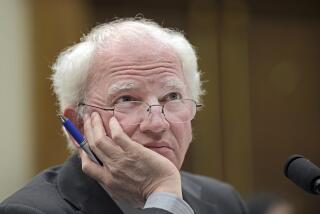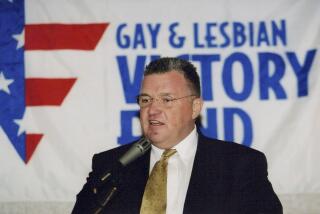The conservative legal star who is fighting for gay marriage
WASHINGTON — Certain law partners no longer call Theodore B. Olson for lunch. Old friends no longer come to dinner at his sprawling house in the woods near the Potomac. One of his best friends died in December, somewhat estranged.
All since Olson — the conservative legal hero, crusader against Bill and Hillary Rodham Clinton, defender of George W. Bush — signed on to fight for same-sex marriage in California, a battle that he will take to the U.S. Supreme Court on Tuesday when he challenges Proposition 8, the state measure that banned gay marriage.
FOR THE RECORD:
An earlier version of this story said Olson would argue the case with a co-counsel. He will argue it alone. It also said that if the Supreme Court strikes down a ban on same-sex marriage in California, gay marriage will be legal nationwide. Such a ruling would not necessarily go that far.
Olson will argue that gays and lesbians should have an equal right to marry, a view that, if shared by the justices in a ruling after Tuesday’s hearing, would strike down the California ban.
PATT MORRISON ASKS: Theodore B. Olson, Legal eagle
“They feel a little rebuffed, that their leader has turned on them,” said Olson’s wife, Lady Booth Olson.
Olson, 72, brushes aside the shunning. The marriage case, the 60th case that he will have argued before the nation’s highest court, has been a transformative experience, he says. He speaks with passion, and sometimes a tear, about the gay men and women, including Republicans, who reach out to thank him.
“Oh, there’s some people who are not very happy about it,” he said in a recent interview. But the case “has changed my life a lot because I think this is so enormously important to so many people. When I talk about it I get very emotional.... I found out that some people I never guessed were gay. Lawyers came up to me and disclosed that about themselves.”
Born in Chicago; raised in Los Altos, Calif., in an “Ozzie & Harriet family”; a graduate of UC Berkeley’s Boalt Hall law school, Ted Olson has been at the center of legal and political battles for more than three decades.
He came to Washington during the Reagan administration when a partner in his Los Angeles law firm, Gibson, Dunn & Crutcher, became attorney general. William French Smith picked Olson to head the department’s Office of Legal Counsel. That made Olson, at 40, the primary constitutional advisor to the president. The two became close, and Olson eventually became President Reagan’s personal lawyer.
Among Reagan-era hard-liners, some had regarded Olson as ideologically soft. But after President Clinton’s election in 1992, he increasingly was drawn into political battle. His identity as a conservative warrior rose as he wooed, and eventually married, Barbara Bracher, another Washington lawyer who became lead counsel in several House investigations of the White House and engaged in what she called “entrenched warfare” with the administration, especially Hillary Rodham Clinton.
After he married Bracher, Olson joined the board of the American Spectator, which had received millions of dollars from a Pittsburgh billionaire determined to bring down the Clintons. He gave the magazine legal advice and wrote several denunciations of the Democratic administration. The American Spectator wrote the first story about President Clinton’s relationship with Paula Jones, who had accused him of sexual harassment. Olson later worked to prepare Jones’ lawyers for a Supreme Court appearance.
Barbara Olson, meanwhile, was writing books attacking Rodham Clinton and frequently appeared on Fox News as an anti-Clinton commentator.
Ted Olson, in an interview, minimized his role.
“Barbara was very active, and I didn’t do much. I wrote a few articles for the American Spectator poking fun at the Clintons mostly,” he said. “I’m not running away from it, but it was something I did in my spare time.”
Lady Booth Olson, a Democrat, sees that chapter of his life a bit differently, as do other close friends. “During the Clinton years, a lot of people lost their compass,” she said. “They went after Clinton like Javert,” she added, referring to the relentless pursuer in “Les Miserables.” Barbara and Ted, she said, “turbocharged one another.”
But it was the election to replace President Clinton in 2000 that made Ted Olson a conservative hero. He persuaded the Supreme Court in Bush vs. Gore to block a planned re-count of presidential votes in Florida. The legal coup handed the White House to the Republican. Bush rewarded Olson by naming him solicitor general, the government’s chief representative at the high court. The nomination sparked a three-month confirmation battle. Worse lay ahead.
On Sept. 11, 2001, shortly after 9 a.m., Olson was in his Justice Department office preparing for the Supreme Court term that would begin in a few weeks. Barbara called, sounding anguished. She was on an American Airlines flight to Los Angeles. It was his 61st birthday, and she had delayed her trip to be with him the night before.
The plane had been hijacked, Barbara said, and she asked what she should do. The call was cut off. She called back, staying on the line long enough for them to exchange quick words of love. Ten minutes later, the plane crashed into the Pentagon.
Olson went home to grieve, surrounded by his closest friends, including Supreme Court Justice Clarence Thomas and Kenneth Starr, who had investigated the Clintons as an independent counsel.
“It was one of those things that you have to decide whether it’s going to be disabling or not, how you are going to live with it, whether you are going to curl up in a corner someplace or whether you are going to move forward,” Olson said.
Olson stuck to his work, delivering his arguments to the court on schedule. Seven months after Barbara’s death, he started dating Lady Booth.
It is a matter of considerable discussion in Washington how much Olson has changed since his marriage to Lady Booth — who is named after an aunt — and whether it has anything to do with his apostasy on gay marriage.
“I think everybody thinks she’s changed Ted,” said Rosalie Blair, the eye surgeon in Washington who introduced them. “She’s certainly made him a little bit — people will say — a kinder, gentler Ted.”
Olson says he doesn’t think his politics have changed, though he concedes that he has “learned a lot” about himself from the current case. He believes gay marriage is a conservative cause.
“There are libertarian conservatives, fiscal conservatives and social conservatives,” he said. “I feel conservative in terms of limited government, individual responsibility, self-sufficiency — that sort of thing.”
“Why would [conservatives] be against individuals who wished to live together and have a stable, loving, long-term relationship?”
But, according to one Olson friend, “there are a lot of people who are very unhappy” about his views — “people close to Ted who because of their faith are strong believers in the sanctity of marriage between a man and a woman.”
“I don’t think Ted has been very brave about facing them,” said the friend, who spoke on condition of anonymity to preserve relations with both sides. “He’s braver in front of the Supreme Court.”
Lady Booth Olson says Washington critics have confused cause and effect. Her husband didn’t change to handle the case, she said; rather, the case changed him.
“When you look discrimination in the face — these people who got up and testified for hours about what it’s like to be denied the right to marry — it’s transformative, really,” she said. “I think he’s starting to open his mind and heart a little bit more than he used to.”
More to Read
Start your day right
Sign up for Essential California for news, features and recommendations from the L.A. Times and beyond in your inbox six days a week.
You may occasionally receive promotional content from the Los Angeles Times.







